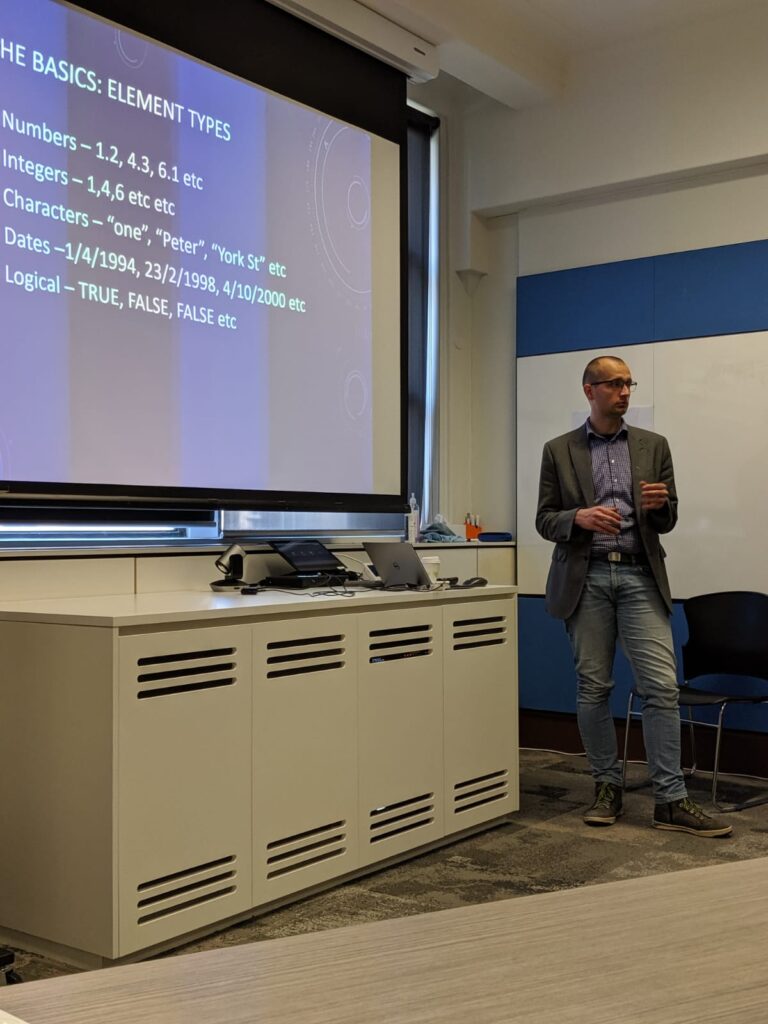Where Theory Becomes Practice.
I design specialized training programs that build enduring technical capacity. Combining simulation-based learning approaches with realistic policy scenarios I transform reluctant beginners into confident practitioners.

Giles has deep experience translating his technical expertise and experience into capabilities that can enhance the analytical capability of organizations. Holding a Masters in International Development, an Honours Degree in economics (Masters Equivalent) and a Data Science Specialization from Johns Hopkins University, he holds a strong foundation in public policy, economics and data science.
Technical Excellence and Capacity Building
Giles delivers tailored training programs that empower organizations to leverage data for informed decision-making. His expertise includes workshops in R programming, data visualization, and comprehensive courses on evidence-based policy. He has led capacity-building initiatives for global institutions, including strengthening parliamentary oversight with the UNDP Pacific Office and enhancing public financial management in Myanmar.
Leadership and Mentorship
Giles brings a wealth of leadership experience from his work managing economists at the International Growth Centre, leading teams of international researchers at the Myanmar Centre for Sustainable Development and provision of expert support to the UNDP’s Floating Budget Office programme. His approach to mentoring focuses on fostering sustainable improvements in analytical capabilities by working directly with research teams navigating complex policy challenges.
Case Study: An Introduction to Programming for Policy Analysis
Problem
After publishing an article on the benefits of using programming languages for applied policy analysis, I received substantial feedback from readers expressing interest in learning how to apply open-source data science tools to their policy work. While some readers were already familiar with these tools, many voiced frustration over the lack of training courses designed specifically for policy professionals. The existing options were often too theoretical, failing to address the practical challenges faced by those working in policy analysis.
To gauge the demand for an introductory data science course tailored for policy professionals, I sought expressions of interest from the broader community. The positive response confirmed the need for a specialized training program that bridged the gap between theory and practical application.
Approach
Leveraging my experience in teaching data analysis to policy professionals, I designed a six-part workshop series focused on introducing policy analysts to the R programming language. The course was structured around real-world policy datasets, ensuring that participants could immediately apply their learning to the challenges they encounter in their roles.
The workshop series covered key programming and data analysis concepts, including:
- Principles of programming
- Data cleaning
- Exploratory and statistical analysis
- Data visualization
- Reproducible research
- Automation in data analysis
By integrating practical examples with hands-on exercises, the course provided a highly relevant learning experience for policy professionals looking to harness data science tools in their work.
Impact
The workshop series was highly successful, with participants consistently reporting that the material was engaging, easy to follow, and directly applicable to their work. The positive feedback highlighted the course’s effectiveness in addressing a critical gap in training for policy professionals.
Key Achievements
- Designed and implemented a data science training series tailored to policy professionals.
- Delivered hands-on training using real-world policy datasets to enhance practical learning.
- Launched the course as an online MOOC on policyanalysislab.com to meet global demand for accessible training.
The course has since been made available online, extending its reach to policy professionals around the world who are eager to develop their skills in applied data analysis.